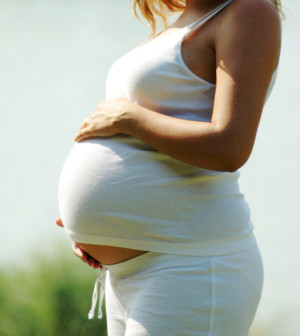- Could Your Grocery Store Meat Be Causing Recurring UTIs?
- Are You Making This Expensive Thermostat Error This Winter?
- Recognizing the Signs of Hypothyroidism
- 10 Strategies to Overcome Insomnia
- Could Artificial Sweeteners Be Aging the Brain Faster?
- Techniques for Soothing Your Nervous System
- Does the Water in Your House Smell Funny? Here’s Why
- Can a Daily Dose of Apple Cider Vinegar Actually Aid Weight Loss?
- 6 Health Beverages That Can Actually Spike Your Blood Sugar
- Treatment Options for Social Anxiety Disorder
Heart Irregularities May Be Linked to Pregnancy Complication

Heart abnormalities between pregnancies may help spot which women with a history of pregnancy-related high blood pressure (preeclampsia) might have an increased risk for the condition in future pregnancies, researchers report.
Preeclampsia is a serious condition that occurs in 3 percent to 8 percent of pregnancies, according to the Italian authors of a study published Feb. 22 in the journal Hypertension. When preeclampsia occurs, sometimes the baby needs to be delivered early to prevent harm to both mother and child, the researchers said.
“Women who have early preeclampsia in their first pregnancy should be informed of their risk and should be carefully followed,” said lead author Dr. Herbert Valensise, associate professor of obstetrics and gynecology at Tor Vergata University School of Medicine, in Rome.
“Physicians have to look at the complicated pregnancy history as a potential risk factor for cardiovascular complications later in life, and in a subsequent pregnancy,” Valensise said in a journal news release. “When we ask about heart risk factors such as smoking, high cholesterol, family history of heart and blood vessel disease, we should also ask about possible high blood pressure during pregnancy, especially early preeclampsia.”
Previous research found that women with a history of preeclampsia are seven times more likely to develop the condition in later pregnancies, and more likely to have heart and blood vessel disease later in life, the study authors said. However, it isn’t yet possible to identify which women are at greatest risk for these complications.
The new study included 75 women who had preeclampsia during their first pregnancy. It also included 147 women who didn’t have the condition during their first pregnancy. The average age of the women was 34. All of the women underwent heart-imaging tests 12 to 18 months after having their baby. Within 24 months, all of the women became pregnant again, the study authors said.
Twenty-nine percent of the women who’d previously had preeclampsia developed it again in the second pregnancy, the study found.
Compared to women who never had preeclampsia or had it once, the women who developed the condition in both pregnancies had between-pregnancy abnormalities in the size and function of their heart’s left ventricle, which pumps blood throughout the body.
Specifically, the left ventricle was thicker than normal. That means the left ventricle has to work harder to pump significantly less blood, the study authors said.
The researchers noted that this was a small study. They said larger studies are needed to confirm the findings.
More information
The U.S. National Heart, Lung, and Blood Institute has more about high blood pressure in pregnancy.
Source: HealthDay
Copyright © 2026 HealthDay. All rights reserved.










